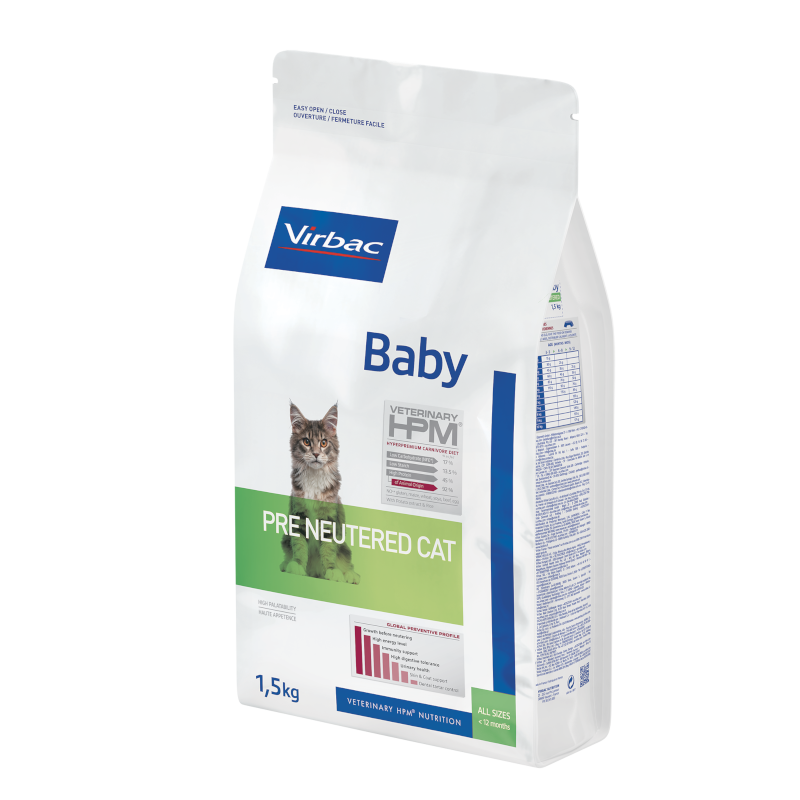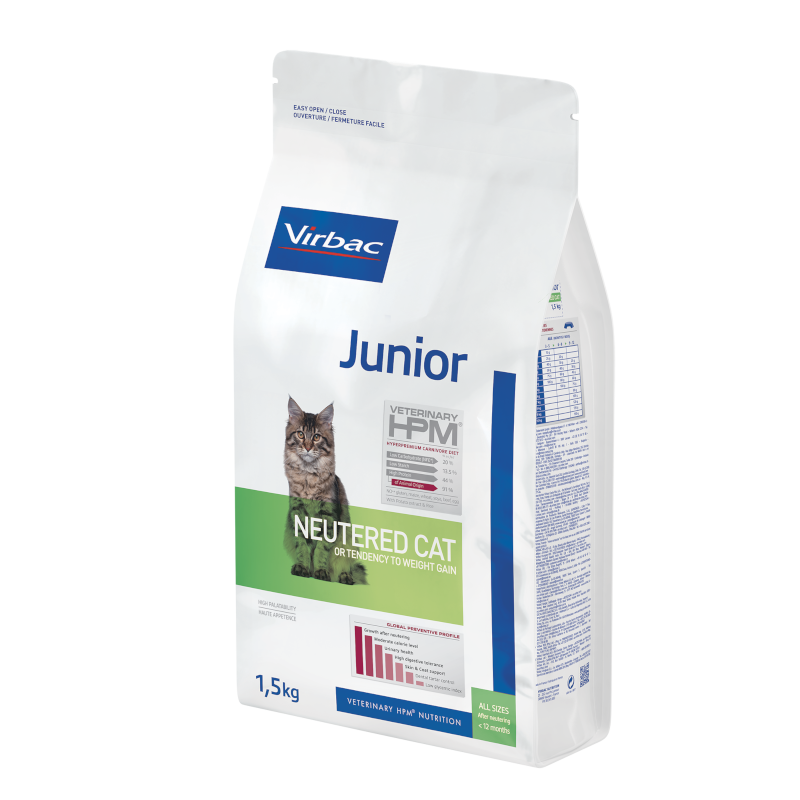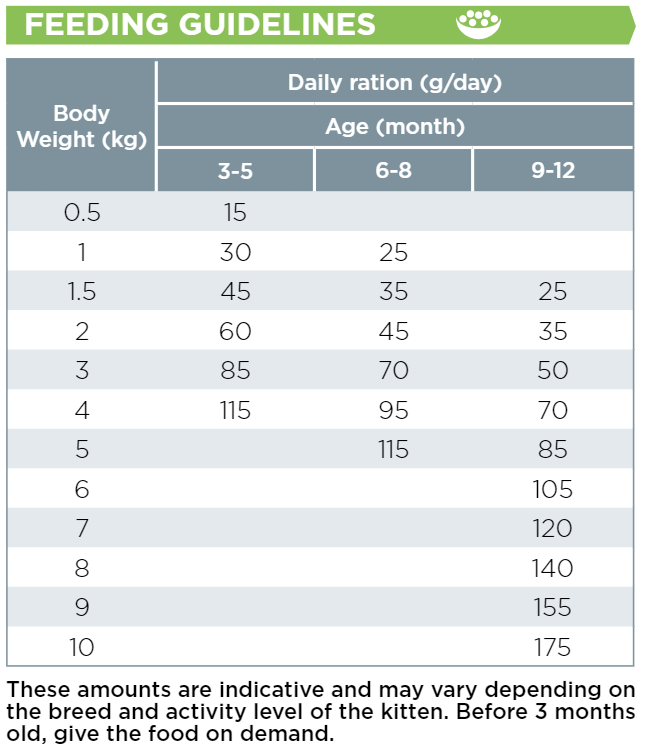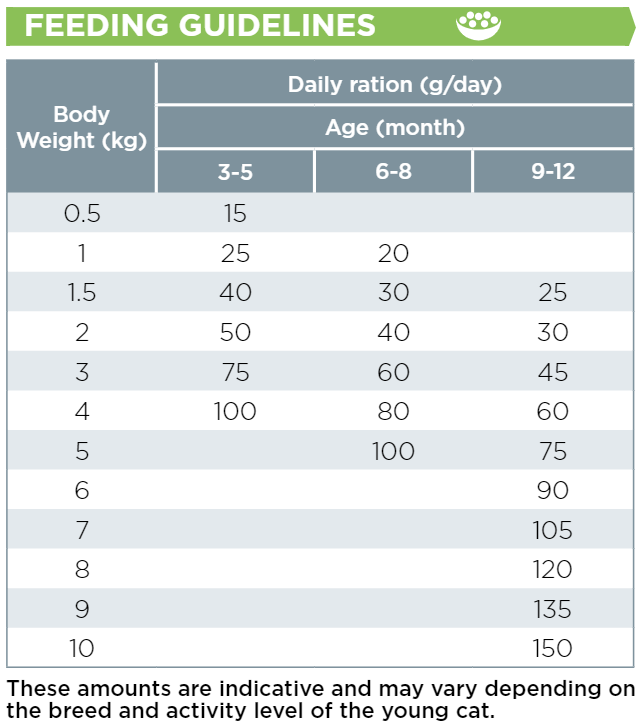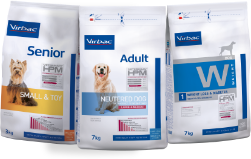
Offer your kitten the best start in life!

Growth is a key period for your kitten’s health
During their growth, puppies have very precise nutritional needs that have to be strictly fulfilled.
Kitten’s growth is very intense. On a 12 months period, your kitten’s weight will be multiplied by 50. In comparison, a human’s weight is multiplied by 20 in 18 years.
At the same time, the kitten’s health is fragile. His immune system and digestive system are immature.
Find more about the optimal nutritional support
That’s why it is very important to choose a high quality complete and balanced diet for your kitten.
 Be vigilant : any nutritional mistake could threaten your kitten’s future adult health!
Be vigilant : any nutritional mistake could threaten your kitten’s future adult health!
Vegetarian diets, as well as raw meat diets, are unadvisable for kittens.
Nutrition plays a key role during this period
GOOD NUTRIENTS IN APPROPRIATE QUANTITY
Apart from your love and care, your puppy needs a precise balance of specific nutrients to grow well.
-
High quality Proteins to ensure the growth of bones, muscles, skin and coat, and support immunity.
-
Very few Carbohydrates, as his still immature digestive system is not able to assimilate them properly.
-
A balanced supply of Minerals to build a healthy bone structure.
-
Essential Fatty Ccids (DHA) to support cognitive development.
NUTRITIONAL REQUIREMENTS ARE DIFFERENT BEFORE AND AFTER NEUTERING
At 3 months, a kitten has twice the energy needs of an adult cat (at equal body weight). That’s why, before neutering, your kitten needs a diet that provides very high energy and fat in small portions.
Neutering, which usually takes place around 5 months of age (*), reduces energy requirements and increases appetite. That’s why it’s essential to modify your kitten's diet after neutering, in order to reduce energy intake and avoid overweight. At 1-year-old, if nothing has been done to restrict their caloric intake, neutered kittens can be 25 % heavier than entire littermates.
In order to protect the kitten’s health and to prevent early obesity development, a close attention must be paid to the growth curve. Obesity is highly prevalent in cats, and recent studies show that the trajectory to obesity is determined early in life, even before neutering. Weigh your kitten every 2 weeks and follow his weight curve. Weight should grow in a smooth and regular way.
More information on the impact of neutering
 Warning : Reducing the ration is not a good solution. This can induce begging behavior as well as nutritional deficits. Your cat must receive all the nutrients essential to its health in sufficient quantities.
Warning : Reducing the ration is not a good solution. This can induce begging behavior as well as nutritional deficits. Your cat must receive all the nutrients essential to its health in sufficient quantities.
Unless your kitten reaches 12 months, switching to adult food after neutering is not a good solution. Neutering usually takes place at 5 months of age and, at this age, the kitten has reached only 65% of total growth. He still needs a diet formulated to cover growth needs.
The solution is to switch to a diet specifically designed for kittens after neutering.
With VETERINARY HPM® growth program, give them the best start in life
Our nutritional program is specially designed to match your kitten's needs all along growth, from weaning to adulthood, before and after the growth peak.
All our diets are made with high quality ingredients and follow Low carbohydrate High Protein concept of formulation, thus ensuring the respect of your kitten’s nature as carnivore.
BABY FOR THE FIRST PERIOD, BEFORE NEUTERING
At weaning, start with VETERINARY HPM ® Baby cat, which is specifically formulated to cover the intense needs of growth before neutering:
- Highly Energetic and Highly Digestible, to cover their intense needs through small rations.
-
High level of highly Digestible Proteins, 90% of animal origin, to support the development of muscles and bones. Proteins associated with Betaglucans also support immunity.
-
Reduced level of Carbohydrates (Starch) combined with added lactobacilli and bentonite allow to cope with their immature digestive system and reinforce digestive comfort.
-
Balanced Minerals (Calcium and Phosphorus) to ensure healthy bone development.
-
High quantities of Essential Fatty Acids (DHA) to support brain and cognitive development.
JUNIOR, AFTER NEUTERING AND UP TO 12 MONTHS OF AGE
At neutering, change to VETERINARY HPM ® Junior Cat.
VETERINARY HPM ® Junior Cat meets the requirements of growth and take into consideration the changes induced by neutering :
-
Less important level of energy and fat than in Baby, because the energy need decreases after neutering. This is key to avoid the development of fat mass and overweight. This allows to maintain ration size and cope with increased appetite after neutering.
-
High level of highly digestible animal origin proteins, to promote muscle mass development and support immune system.
-
Reduced level of carbohydrates (starch), for digestive tolerance.
Do's and Don'ts
 Weigh your kitten every 2 weeks and follow his weight curve.
Weigh your kitten every 2 weeks and follow his weight curve.
 Regularly check and adapt the ration according to your puppy’s weight. If you have any difficulties or questions, contact your veterinary clinic.
Regularly check and adapt the ration according to your puppy’s weight. If you have any difficulties or questions, contact your veterinary clinic.
 Strictly follow the daily ration advised. Offering food free choice, excessive daily rations or above caloric needs, especially when a diet has a high fat content, favors the development of obesity and osteoarticular disorders.
Strictly follow the daily ration advised. Offering food free choice, excessive daily rations or above caloric needs, especially when a diet has a high fat content, favors the development of obesity and osteoarticular disorders.
 Raw meat (Barf) or vegetarian diets are strictly inadvisable for puppys. Such diets can cause major nutritional deficiencies with serious consequences on health.
Raw meat (Barf) or vegetarian diets are strictly inadvisable for puppys. Such diets can cause major nutritional deficiencies with serious consequences on health.
 Do not give leftover food that is too fatty, salty or sweet.
Do not give leftover food that is too fatty, salty or sweet.
 Do not add mineral and vitamin supplements.
Do not add mineral and vitamin supplements.
 Don’t feed your kitten with an Adult dog food.
Don’t feed your kitten with an Adult dog food.
Read more about the best practices when you bring your kitten home
- Can I feed my kitten with a home-made diet?
The food that kittens receive throughout their first year must obviously provide energy and materials to build the skeleton, the muscles and all the new tissues. But nutrition doesn't stop there: it must also help kittens to develop a fully functioning nervous system and effective immune system. Any deficiency in essential nutrients (those who cannot be synthesized by the animal's body) during this very delicate period may affect the cat's future health.
Many recipes developed by veterinary nutritionists are available for owners who wish to prepare a nutritionally balanced home-made diet for their kitten. However, it is illusory to succeed in respecting all the required conditions because the nutritional balance of a household ration is subject to various hazards. The owner will always find it difficult to follow the recipe exactly, the necessary ingredients are not always available, and the nutritional composition of the ingredients can vary considerably depending on the origin of the product. When preparing a home-made diet, no laboratory analysis can verify the nutritional composition of the raw materials used!
Therefore, even when accompanied by the distribution of a mineral and vitamin supplement, home-made diets for cats often show deficiencies in several nutrients such as choline, iron and thiamine. In addition, cats cannot synthesize vitamin D as humans do (via exposure to UV rays) and this vitamin must be provided daily in the diet.
- What quantity of kibbles does my kitten need?
VETERINARY HPM® is very palatable, but we do advise that you respect the daily rations recommended by your vet or vet nurse. Our general feeding guidelines can be found on every bag, but your vet or vet nurse can provide you with a recommendation tailored specifically to your kitten.
Baby Pre-neutered cat
![guidelines cat baby.png]()
Junior Neutered cat
![guidelines cat jun.png]()
- Can I feed my kitten with raw meat diets?
Raw meat diets (red meat or chicken) are very popular among certain cat breeders but raw meat diets are deficient in calcium and phosphorus. The Calcium/Phosphorus ratio is totally inappropriate for the feline species, especially in terms of bone growth. Such a diet can cause major nutritional deficiencies with serious consequences on health. For example, when fed exclusively a raw meat diet, the kitten is exposed to the risk of pathologic fractures following minor trauma.
- Can I feed my kitten with a vegetarian diet?
The cat is a strict carnivore, which means that certain nutrients it needs cannot be provided by a plant-based diet. Such diets can cause major nutritional deficiencies with serious consequences on health. For this reason, a kitten should never be fed a vegetarian diet.
- How many meals should I give to my kitten every day?
Cats being nibblers, it’s recommended to give your kitten his daily ration in several small meals spread over the day. Breaking up his food distribution also seems to promote physical activity in your cat and help him maintain his ideal weight. Measure his daily ration and fraction it to distribute it all along the day.
- How can I see if my kitten grows well?
In order to protect the kitten’s health and to prevent early obesity development, a close attention must be paid to the growth curve. Obesity is highly prevalent in cats and recent studies show that the trajectory to obesity is determined early in life, even before neutering.
Your veterinarian will be able to help you access kittens' standard growth curves.
- How do I change the diet of my kitten from my current diet to the new VETERINARY HPM® growth program?
At weaning, your kitten must progressively get used to solid food instead of mother’s milk. You can add some warm water to the kibbles at the beginning.
If you change from another dry food to VETERINARY HPM®, to help your kitten's digestive system adapt successfully to the new food, we recommend that you introduce VETERINARY HPM® gradually over a period of 5 to 7 days
![diet_infographic.png]()
- How to organize your kitten’s meals?
His feeding area should be quiet and clean, away from the litter area.
- Provide two bowls, one for water and one for food.
- Choose unbreakable, odourless containers.
- Keep water available at all times, clean and fresh. If you have several cats, provide several water points. Keep the water bowl away from the food bowl and the litter box.

Because correct nutrition is first of all a matter of health, VETERINARY HPM ® is available from veterinary practices (or the Virbac Web Store). Our stockist locator helps you to find in one click your nearest Veterinary practice stockist which either proposes our nutrition or to buy online.


